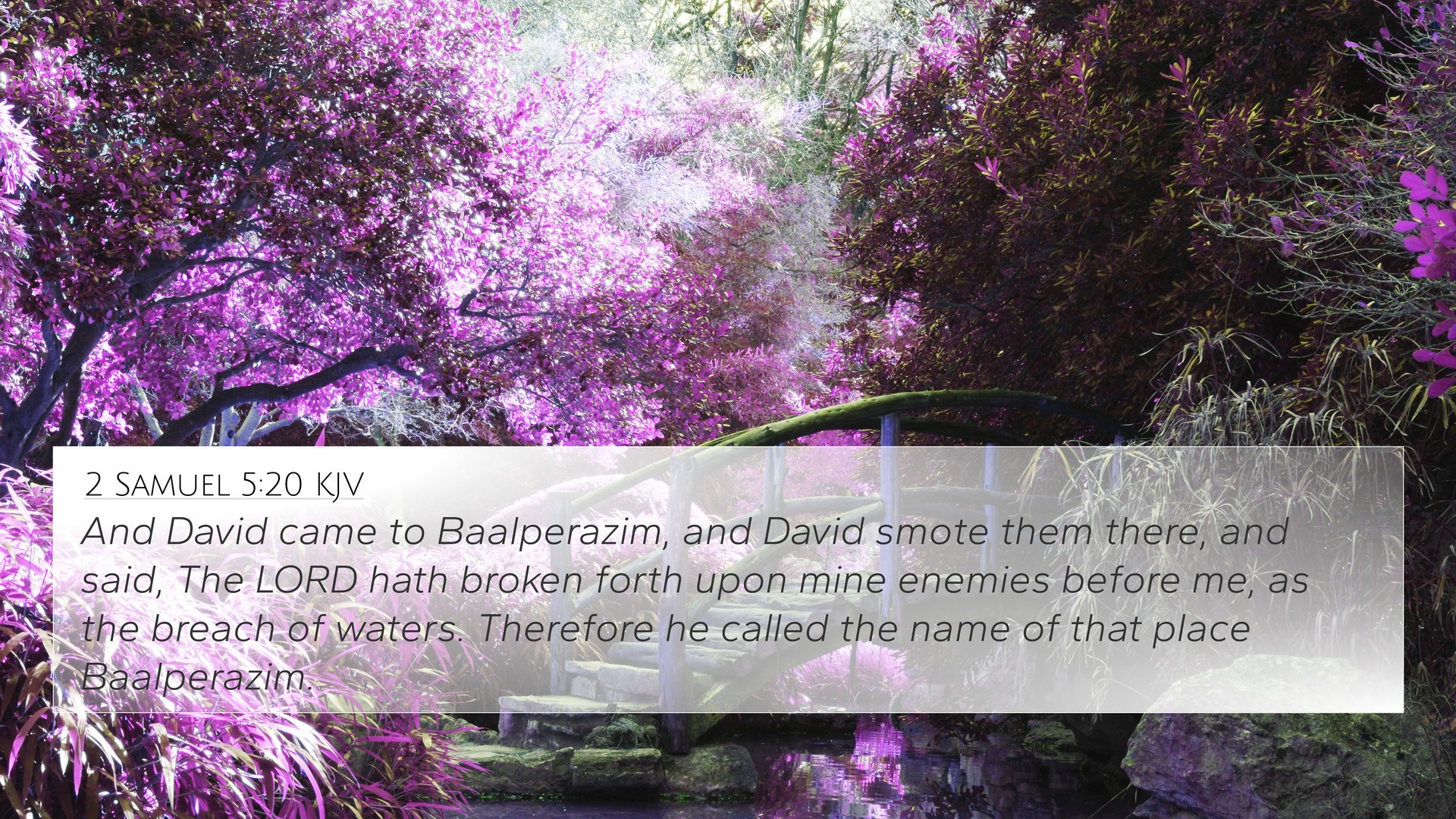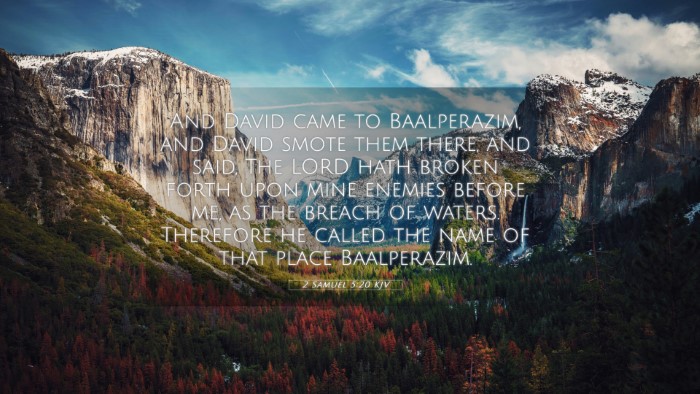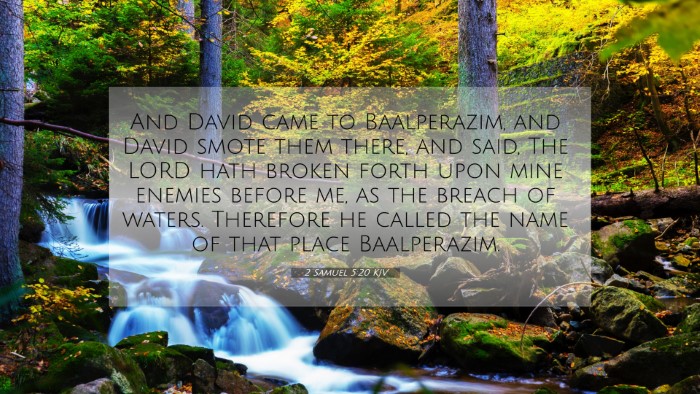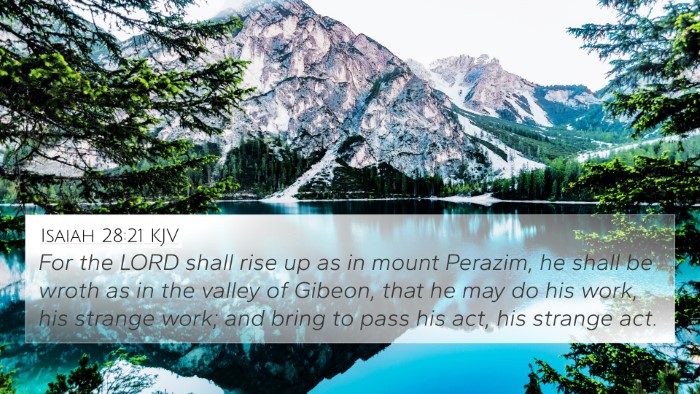Understanding 2 Samuel 5:20
In this passage, David's military success is attributed to divine intervention, showcasing the profound theme of God's guidance in the lives of His chosen leaders.
Verse Context
2 Samuel 5:20 states:
“And David came to Baal-perazim, and David smote them there, and said, The Lord hath broken forth upon mine enemies before me, as the breach of waters. Therefore he called the name of that place Baal-perazim.”
Insights from Commentaries
-
Matthew Henry:
Henry emphasizes that David's victory symbolizes God's powerful presence and action. He notes that David’s acknowledgment of God’s role in his triumph reflects humility and faith. Baal-perazim translates to "lord of breakthroughs," stressing the transformative nature of divine intervention in warfare.
-
Albert Barnes:
Barnes points out that the "breach of waters" indicates a sudden and overwhelming victory, likening God’s power to a burst dam. He suggests that this metaphor illustrates God’s authority over adversaries and emphasizes the need for reliance on divine strength rather than human might.
-
Adam Clarke:
Clarke provides detailed insights into the geographical and historical significance of Baal-perazim, discussing how its naming reflects the spiritual victory David achieved. He further connects this experience to broader biblical themes of faith in the face of conflict, positioning David as a model for trust in God during adversity.
Themes and Connections
This verse encapsulates several significant theological themes:
- The sovereignty of God: The acknowledgment of the Lord as the source of victory highlights His overarching control over circumstances.
- The importance of remembrance: David named the location as a testament to God's intervention, serving as a memorial for future generations.
- Victory in spiritual warfare: This narrative also correlates with themes in the New Testament regarding spiritual battles, particularly Ephesians 6:12, which discusses contending against spiritual forces.
Bible Verse Cross-References
Here are some relevant Bible verses that relate to 2 Samuel 5:20, enhancing the understanding of its themes:
- Psalm 18:29 - "For by you I can run against a troop, and by my God I can leap over a wall." (Emphasizing reliance on God for strength)
- 1 Chronicles 14:11 - "So they came up to Baal-perazim; and David smote them there." (A parallel account affirming the location and significance of the victory)
- Exodus 14:14 - "The Lord will fight for you, and you shall hold your peace." (Echoing the theme of God’s intervention)
- Romans 8:31 - "What then shall we say to these things? If God is for us, who can be against us?" (Affirmation of God’s support in challenges)
- 1 John 5:4 - "For everyone who has been born of God overcomes the world." (Connecting faith with victory)
- Isaiah 59:19 - "When the enemy comes in like a flood, the Spirit of the Lord will lift up a standard against him." (The imagery of divine resistance to enemies)
- 2 Corinthians 10:4 - "For the weapons of our warfare are not carnal, but mighty through God to the pulling down of strongholds." (Relating spiritual warfare to David's victories)
Summary of Cross-Referencing Methods
This exploration of 2 Samuel 5:20 provides a practical insight into how cross-referencing can deepen one's understanding of scripture. By linking 2 Samuel 5:20 with related verses, one can discern patterns and themes that recur throughout the Bible.
- Tools for Bible Cross-Referencing: Utilizing a Bible concordance or a Bible cross-reference guide can facilitate discovering thematic connections.
- How to Use Bible Cross-References: Readers can start by identifying keywords in a verse and exploring different biblical narratives that share similar themes.
- Cross-Referencing Bible Study: Engaging with cross-references allows for a comparative Bible verse analysis, enhancing one's grasp of scripture's unity.
Conclusion
2 Samuel 5:20 serves as a potent reminder of God's crucial role in the victories we experience. By studying this verse in conjunction with its related scriptures, believers can cultivate a deeper understanding of God's faithfulness and strength in life's battles. The interconnectedness of Bible verses reveals a rich tapestry of divine truth that continues to inspire and guide.
Further Reflections
Consider reflecting on personal experiences that mirror the principles found in this verse. How have you witnessed God’s breakthroughs in your life? Utilize the themes of victory, divine support, and remembrance to enrich your understanding and application of scripture.



